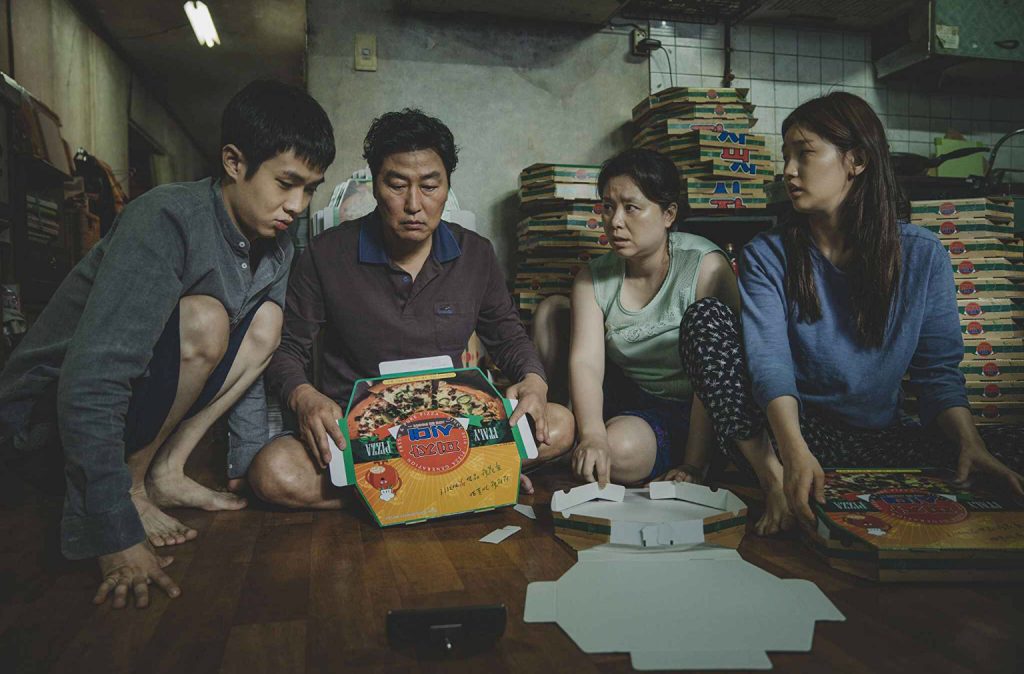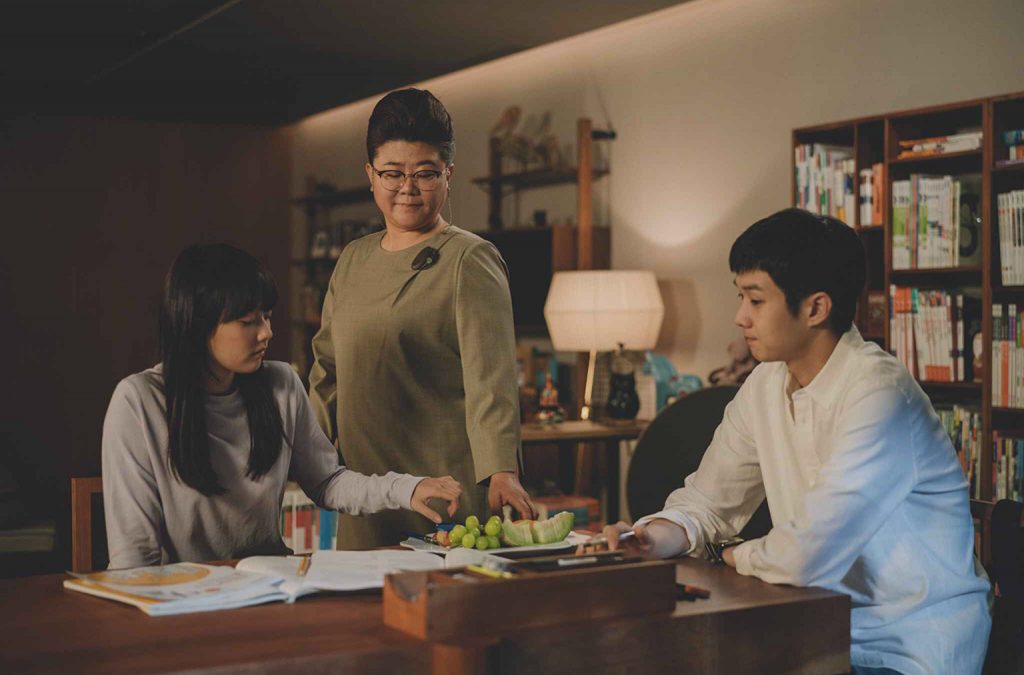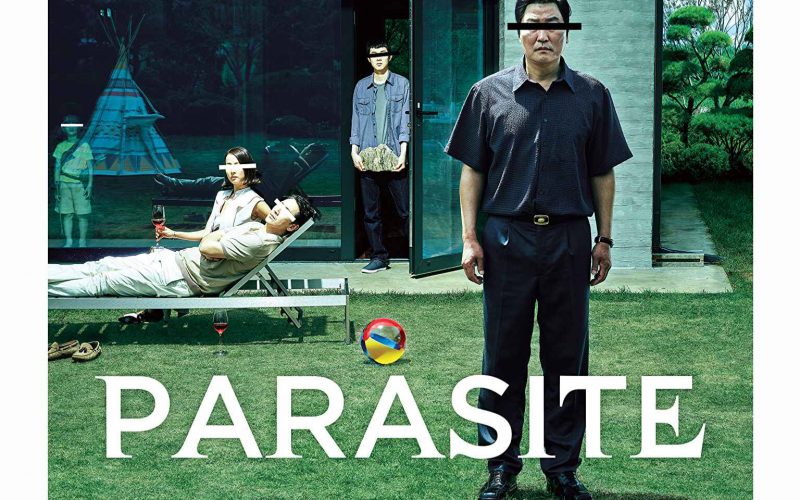Parasite (2019).
How often are the wealthy used as the villain, or more often still the deserved punchline of a demeaning joke? Joon-ho Bong is just as aware of this trope as his audience. He plays into it with a hilariously heavy hand, and then pulls the goggles from our faces and throttles us with tonal shifts that shouldn’t work nearly as effectively as they do here. The result is a film as funny as it is disturbing, as thrilling as it is horrifying. And in many respects as good a film as you’re likely to see this year.
The film follows father Kim Ki-taek ( (Song Kang-ho), his wife Choong Sook (Jang Hye-jin) and their teenage children Ki-woo (Choi Woo-shik) and Ki-jeong (Park So-Dam), a family struggling to make ends meet, living in a basement and without stable employment between the four of them. When Ki-woo is recommended by his friend for a job tutoring the daughter of a wealthy family, he hatches a plan and over time the entire family falls under the employ of the naive and easily manipulated Park family. Eventually, Ki-woo becomes the teacher and lover of the family’s eldest child, Ki-jeong the severely under-qualified ‘art therapist’ to the supposedly gifted youngest child, and mum and dad act as maid and driver respectfully.

Up to here, it’s a wonderfully funny, and rather warm, rags-to-riches tale, though there is something more rising up to the surface of what’s pretending to be a wholesome triumph for a family that started with nothing. The class gap is the basis for the film’s dramatic tension – how can one family be so wealthy and one so poor? But then the poor become greedy, spurred by their sudden turn of fortune and proud of the deceit with which they’ve pulled it off – ignorance might be a more sympathetic flaw. The film starts to swerve once the Park family leaves the house unoccupied. All of a sudden, there’s no limit to what the intruding heroes may or may not do. At this point, they feel pretty invincible. And from here, the script (by Joon-ho and Jin Won Han) is fresh, unpredictable, and ultimately shocking. It’s occasionally hard to tell what kind of film we’re spectating, as though we’re being as equally deceived as the unfortunate family on the end of this elongated and meticulous scheme.
The more we learn about each family, the more conflicted we become on who we really care about and who deserves what. It’s in this way that the script flips our expectations on their heads. This wealthy family, with everything they could need and want and with a mansion looming over the lesser parts of town being a quite obvious visual motif for that, is lovely. More to the point, and contrary to an audience that may be used to feeling the opposite, they certainly don’t deserve to be taken advantage of in such a manner. And yet Joon-ho isn’t interested in capturing one family in a brighter light than the other. There are redeeming qualities on both sides, and questionable ones too. This all services the obvious contrast between the two and quite comfortably sets the stage for the film’s many joyous interactions. We’re in on the joke, which makes it funny until we start to sympathise with those that aren’t in on it at all.

Poverty does not define this quartet of characters. Instead, it’s their hearty camaraderie, matched with an off-kilter brand of intelligence, that initially wins our hearts. Many will identify with their every-day tribulations, even if not to the same extent; who hasn’t had to search high and low for a WiFi connection at one time or another? In the aftermath of a damaging flood that forces the less fortunate members of the community into the local gymnasium for the night, the well-meaning matriarch of the rich family (wonderfully performed by Jo Yeo-jeong) is grateful for the rain and high-spiritedly puts together an impromptu party. Our impulses are forced into question and the film asks us to look at the human behind the wealth and good fortune, and simultaneously at the cunning family that grabs an opportunity with clawed hands. In a world in which we often place value upon a person’s wealth or status, the characters in Parasite act in ways that are either appropriate or not so regardless of their position.
The deft and energetic hand with which the film’s most suspenseful moments are crafted is an enormous part of its appeal. There are long scenes in which one con will play out, cut together with rehearsals of those cons, that I’d class as perfect examples of creating stories within scenes; there’s a beginning, middle, and an end to the individual cons, and hell, one of them even drew applause from audience members when the payoff finally came.

Parasite will have its less enthusiastic crowd (the man beside me left the theater about halfway through and didn’t return), perhaps not quite succumbing to its deadpan humour. Something tells me though that the third act will be the most divisive for viewers. The fates of its main characters leaves a bitter taste and, while at times there seems to be a point, characters seem to contradict the moral of their individual stories. And yet, we can examine the bigger picture as one in which desperate people show us just how deep they are willing to dive for just a taste of luxury. Hardship can breed bitterness, and beneath the wit and hilarity is a lot of toxic emotion. It’s here that the film beautifully captures the less pleasant aspects of its narrative.
Theme is often one of the central components in the formation of a successful screenplay. One as near to perfect as this manages to keep its theme secondary, because at the end of the day the aim here is to tell a black comedy that, above all else, entertains. To that end, Parasite is a roaring success. It’s everything else about it that sticks with you.
Film ’89 Verdict – 9/10
Parasite is the winner of the coveted Palme d’Or at this year’s Cannes Film Festival (making it the first Korean picture to win the prize) and is on limited theatrical release across Australia June 27th, with a US release October 11th.


